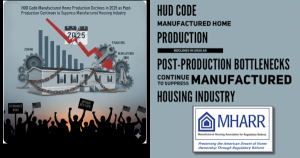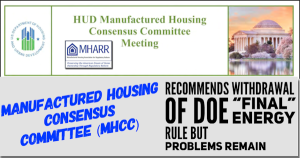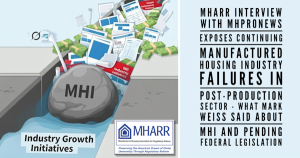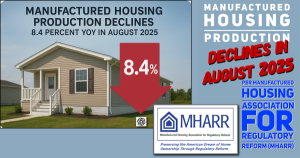MHCC Regulatory Enforcement Subcommittee Advances MHARR Regulatory Reform Proposals
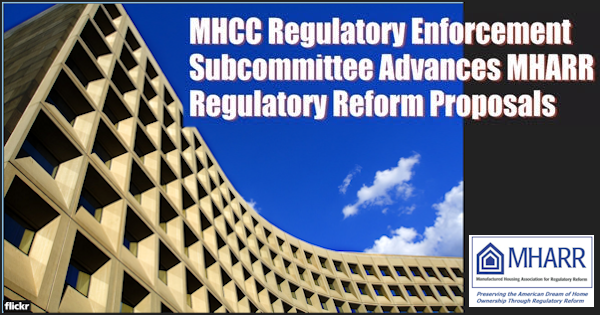
The Regulatory Enforcement Subcommittee of the Manufactured Housing Consensus Committee (MHCC), during an extended conference call on August 6, 2019, has advanced a number of key HUD manufactured housing program regulatory reform proposals submitted by MHARR in 2017 and 2018 comments to HUD, which were subsequently provided to MHCC members in advance of the MHCC’s last in-person meeting in April 2019. MHARR’s proposals, along with others referred by the Subcommittee – and still others to be considered at a scheduled August 14, 2019 Regulatory Enforcement Subcommittee conference call — will ultimately go to the full MHCC for consideration at an in-person meeting expected to be held in October 2019. Once endorsed by the full Committee, the proposals will be forwarded to HUD for final action in accordance with Trump Administration Executive Orders (EO) 13771 and 13777. In the interim, MHARR will monitor other matters addressed by its comments, which may be assigned to other MHCC subcommittees in advance of the October 2019 in-person meeting.
The MHARR regulatory reform proposals advanced (either individually or, in some cases, together with similar related proposals) by the Regulatory Enforcement Subcommittee include:
- DRC 2: Although included by HUD with proposals addressing the Department’s unnecessarily burdensome and costly on-site completion rule, this proposal, in actuality, calls for the repeal of HUD’s 2010 Interpretive Rule, which emasculates – and effectively reads out of the law — section 604(b)(6) of the Manufactured Housing Improvement Act of 2000.That section requires prior MHCC review and notice and comment rulemaking for any change to HUD “policy” or “procedures” relating to the federal manufactured housing standards and their enforcement. As reported previously by MHARR, the MHCC General Subcommittee voted to conduct further study regarding this matter in response to DRC 281, a nearly identical MHARR proposal. The Regulatory Enforcement Subcommittee, for its part, agreed to forward this proposal to HUD, while deferring to the General Subcommittee for the development of any necessary language.
- DRCs 17 and 89: These proposals call for the repeal of HUD’s on-site completion final rule (Procedural and Enforcement Regulations, Subpart M) which substantially departed from prior MHCC recommendations, resulting in an overly complex, overly burdensome, unwieldy and unnecessarily costly system for on-site completion items. Based on this and other similar comments, the Subcommittee agreed that the existing HUD on-site rule is unduly burdensome and complex, and needs to be revisited and revised, with the Subcommittee to develop appropriate regulatory language.
- DRC 26: This proposal calls for the reform of Subpart I of HUD’s Procedural and Enforcement Regulations which, as MHARR has consistently emphasized, is one of the primary drivers of unnecessary regulatory compliance costs and burdens within the entire HUD regulatory system for manufactured housing. Subpart I, moreover, has been abused for 40-years by HUD’s entrenched contractor to impose excessive, unreasonable and unnecessary demands on manufacturers that needlessly increase costs to consumers. The Subcommittee voted to include this proposal with other action items – that will be further considered by the Subcommittee — calling for changes to definitions (g., “nonconformance”) that are relevant to Subpart I. MHARR’s proposal, however, goes well beyond mere changes to definitions and calls for broader changes to Subpart I. MHARR will address this further at the in-person meeting of the full MHCC.
- DRC 138: This proposal calls for the repeal of pre-2000 HUD federal preemption guidance, which fails to give full effect to the enhanced preemption of the 2000 reform law. It is important to note, however – as MHARR will explain to the full MHCC when this matter is addressed – that, as submitted to the Subcommittee by HUD, this DRC does not reflect the full MHARR regulatory reform request regarding federal preemption. Specifically, MHARR, in its comments, does not merely call for the withdrawal of outdated and superseded pre-2000 reform law HUD preemption “guidance,” but also expressly calls on HUD to: “fully implement the enhanced preemption mandated by the 2000 reform law, including the preemption of ‘zoning’ and placement restrictions which discriminatorily exclude HUD Code manufactured housing; and … engage the MHCC to develop new, replacement guidance on the scope and applicability of the enhanced federal preemption mandated by the 2000 reform law.” (See, MHARR February 20, 2018 regulatory reform comments to HUD at p. 27). The need to address zoning and other discriminatory limitations on the use and placement of manufactured housing is fully consistent with – and would act to implement — the statements and policies of both President Trump and Secretary Carson. The Subcommittee voted to refer this proposal, together with similar comments, to HUD.
All of the targeted proposals contained in MHARR’s regulatory reform comments to HUD were designed to advance specificreform objectives of the 2000 reform law that have either been ignored or emasculated by the HUD program under its prior leadership. Their advancement and ultimate adoption is essentialto the full, proper and final implementation of both the 2000 reform law and to the fulfillment of the objectives of both President Trump and Secretary Carson under EOs 13771 and 13777.
MHARR will continue to aggressively advance these regulatory reform proposals which were submitted to the administration beginning immediately following the publication of regulatory reform EOs 13771 and 13777.

